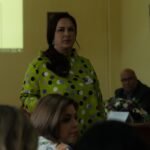Module 4
About Course
The module you’ve provided is titled “Communication Skills and Intercultural Communications for Teachers Working in Schools with Roma Students.” This training module is designed to enhance teachers’ communication skills and intercultural competence, focusing specifically on fostering positive relationships, inclusivity, and academic success in diverse educational settings. The module includes theoretical discussions, practical exercises, and guided activities aimed at improving communication strategies, cultural awareness, and understanding between teachers, Roma students, and their families.
Key Components of the Module:
Importance of Communication in Education: Exploring effective communication strategies to build positive learning environments and resolve conflicts.
Active Listening Techniques: Enhancing understanding and empathy through attentive listening.
Nonverbal Communication: Understanding and employing nonverbal cues to convey respect and build rapport with Roma students.
Intercultural Communication Competence: Developing sensitivity to cultural differences to foster an inclusive educational environment.
The aim of the project is to equip teachers with the necessary communication skills and intercultural competencies to effectively engage and support Roma students in educational settings. By enhancing teachers’ understanding of cultural differences and providing them with practical tools for fostering positive interactions, the project seeks to create more inclusive and supportive learning environments. Ultimately, the goal is to improve educational outcomes for Roma students by ensuring that teachers are better prepared to address their unique needs and challenges within the school context.
Course Content
Unit 1 – Importance of Communication in School Settings
-
Importance of Communication in School Settings
00:00 -
Presentation
00:00 -
Lesson Plan
00:00
